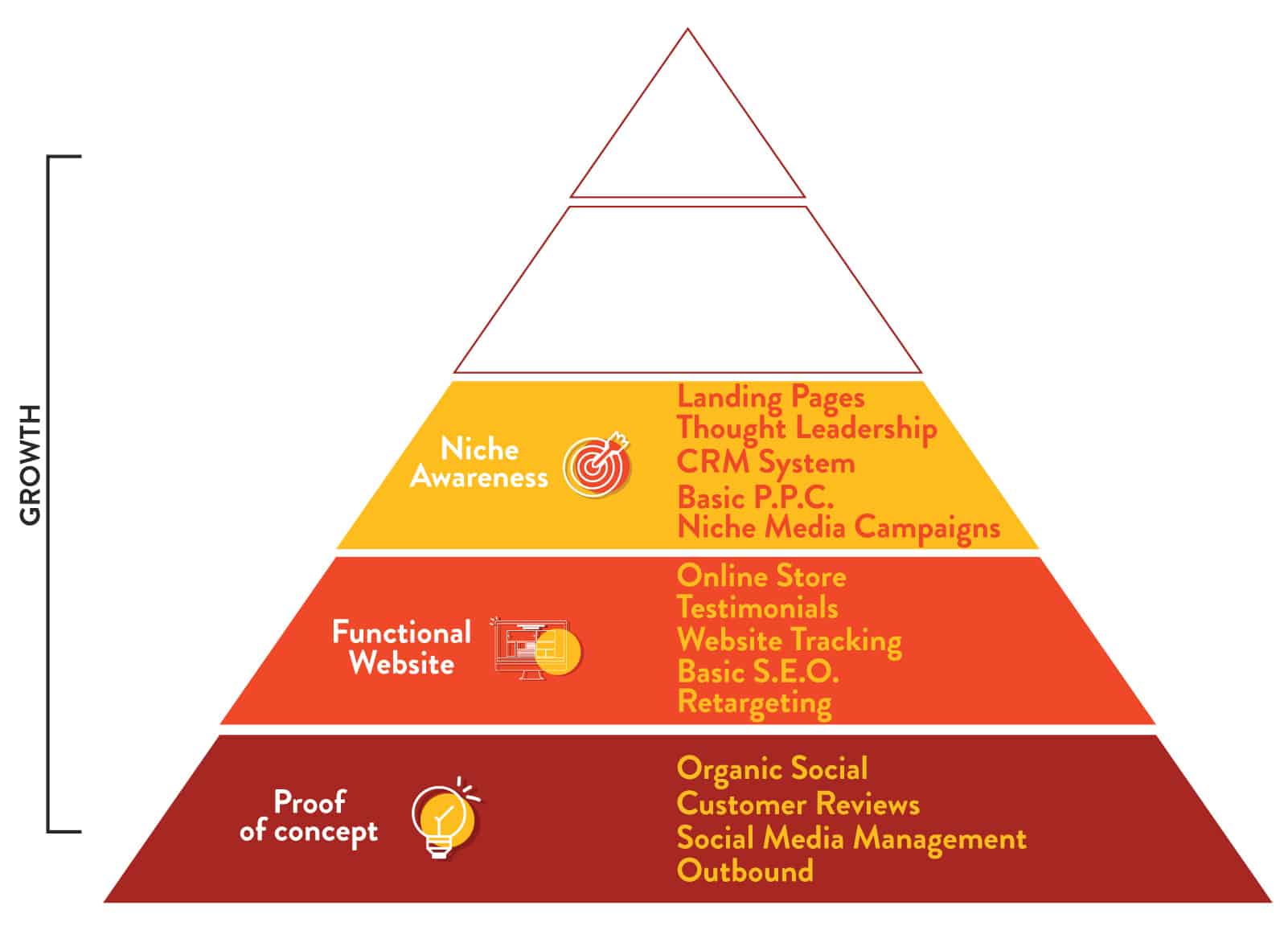eCommerce Marketing Hierarchy of Needs: Part Three

Welcome to part three of our eCommerce Marketing Hierarchy of Needs. This edition is all about tactics to gain brand awareness within a specific niche market. You may wish to check out the prerequisites outlined in the first and second parts of the series before reading this entry. The recommendations that follow assume that you’ve already proven your business concept and created a basic and functional website.
If you’re at the stage where you find your website is working as intended, orders are coming in with consistency, people are finding you via social media and word of mouth, then you may be ready for Tier 3. The tactics in this section start to require more resources. You’ll be best served choosing a niche target market that’s broader than your personal network, but still relatively small. Focusing your efforts on a small niche will get better bang for the buck than a one-size-fits-all approach, especially with limited resources.
For each tier in the eCommerce Hierarchy of Needs, we look at marketing from the perspective of five important facets:
- Customer Experience: How customers interact with your brand and complete purchases.
- Reputation: How customers learn your brand is legitimate.
- MarTech: How technology aids your marketing efforts.
- Search Marketing: How to utilize search to find customers.
- Paid Advertising: How to best spend your ad budget.
Tier 3: Niche Awareness
Customer Experience: Landing Pages
Many advertisers make the mistake of sending new website traffic to their homepage. But having landing pages customized to speak to a particular audience will lead to a much better conversion rate. Whereas a homepage is meant as a catch-all, a landing page can assume some context about what products or services users are interested in and some characteristics of the target audience.
Reputation: Thought Leadership
The goal with putting out quality content is two-fold: first and foremost it is to cultivate the perception that your organization has expertise. These days, across virtually any product or service category, there’s a ton of competition and it’s difficult for customers to differentiate offerings. Demonstrating your expertise is a great way to stand out from the crowd. This can be done by posting insightful blog entries, distributing quality content via email, hosting webinars or hangouts, and maintaining a regular newsletter. The second big benefit of thought leadership is the SEO benefits. Google really likes quality content about niche subjects, and increasingly the amount users engage with your website determines your organic search ranking.
MarTech: CRM System
There’s a psychological concept called Dunbar’s number, which is used to describe the correlation between the size of a primate’s brain, and the number of individuals the primate is capable of maintaining a relationship with. For humans, we are capable of maintaining relationships with about 150 people. This poses problems for business people who may have many hundreds or thousands of contacts; it’s simply impossible to genuinely care and remember details about all of them. If you happen to be one of my clients reading this part, don’t worry, you’re totally within my 150. Anyway, CRMs mitigate this problem by providing a repertoire of key info about your customer base, so you can lookup valuable insights into your customers and offer personalized customer service. It’s at this stage that you should consider implementing a CRM for tracking and segmenting purposes. Later on, having a solid CRM database will open up a variety of highly personalized marketing tactics.
Search Marketing: Basic PPC
The appeal of pay-per-click marketing, which most often occurs through Google AdWords, is the simplicity of it. You can reach a relevant audience while they are actively looking for a solution like yours. The math for PPC campaigns is also simple. If your avg. customer lifetime value multiplied by your conversion rate is greater than your cost-per-click, then you’re making money.
For example: If an average customer is worth $100, and your website converts at 2%, then every click is worth $2.00 to you. So you don’t want to bid more than $2 per click.
It’s very easy to make some assumptions, and get started with a basic PPC campaign. However, turning a PPC campaign into a well-oiled machine takes an ongoing effort of measurement, testing, optimizing, and scaling. At the beginning you may not know your conversion rate with a great deal of certainty due to a lack of sample size. It takes tens or hundreds of thousands of sessions to get statistically significant data, and this isn’t realistic for most businesses at this stage of growth. So you’ll have to make some educated guesses about which keywords to target and how to allocate your budget.
Paid Advertising: Niche Media Campaigns
Most people think of the traditional banner ad when they think about online advertising. In recent years, there’s been much fanfare about ad blockers and how their increasing adoption threatens websites that rely on advertising revenue. But we’re already seeing online media evolve, as other tactics like podcast sponsorships, native advertising, and video ads become more popular. More advertising is moving towards social media as well. Sites like LinkedIn and Facebook in particular have extensive information about their members that you can tap into to really narrow down who will see your ads. There are also increasingly more affordable options for traditional media (newspapers, TV, radio, billboards). We’ve all heard the stories about the struggles of traditional media recently; there have been declining revenues and many layoffs. The nice thing is that the cost has come down to the point where companies who in the past would’ve been priced-out, can now afford traditional media.
Thanks for entertaining this third edition of our Hierarchy of Needs. The next installment will discuss marketing tactics to scale your business.
Questions? Comments? Typo to report? We’d love to hear from you!
Posted March 2, 2018
Categories: Hierarchy of Needs,
Uncategorized,
Advertising and Marketing General,
Business Growth
Tags: Advertising, Content Creation, Marketing Tools, search marketing, SEO

